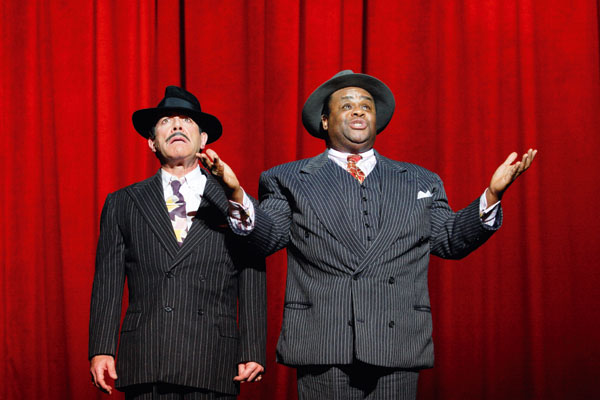Tough play, The Taming of the Shrew. Uniquely among Shakespeare’s comedies, it moves audiences to pity and fear. It’s a video-nasty in the garb of a marital farce, an uncomfortable romance whose closing reconciliation scene invariably draws lusty hisses from female play-goers as Kate renounces her autonomy and bows to the will of her brutal husband, Petruchio. Directors prefer to approach this squirm-inducing parade of sexual violence through the comforting distortions of a veil. Single-gender productions are popular. In a Gujurati version, Kate is portrayed as an immigrant and the title had been coyly changed to A Foolish Foreign Woman Comes to Her Senses.
Cole Porter goes for the vegetarian option by taking us backstage during a tour of the play. The actors playing Kate and Petruchio are disenchanted lovers who still have feelings for one another. The set-up is far from simple. In the opening scene we meet Lilli, a fading movie star playing Kate, who learns that her ex-squeeze, Fred (playing Petruchio), has seduced an actress named Lois who plays Bianca. This swarm of info is complicated by the unfamiliar setting in Baltimore, 1948. The script is crammed with local references centred on the comic idea that the city is a dump riddled with philistines and gangsters.
Trevor Nunn’s production takes time to warm up. Blame the script. With backstage comedies, where the leads must play both themselves and a dramatic character, there’s always a great diminution of psychological interest. In Shakespeare, Petruchio is a swaggering, virile anti-hero. But who is Fred in this decaffeinated version? Well, Fred is a charming duffer who goes on a short and predictable journey from philandering love-rat to chastened prodigal. Not terribly fascinating. Lilli/Kate has a better claim on our interest because her bursts of violence are athletic and funny and her contribution to the gender debate — ‘I Hate Men’ — is succinct and nicely barbed.
Yet her character makes little sense. On stage, she’s a raging harpy but as soon as she totters back to her dressing-room she dwindles into a self-pitying kitten who cries buckets when she discovers a bunch of flowers that she wrongly believes has been delivered by Fred as a peace offering. This makes no sense at all. She’s either a weepy little hummingbird or she’s a lady thug swinging her fists around and clattering heavyweights to the ground.
The most layered and satisfying character is Lilli’s lover, General Harrison Howell. Ambitious and well-connected, Howell is a strutting, xenophobic war hero who dreams of marrying Lilli and taking her to the White House. Both Truman and Dewey have invited him to stand as their running mate in the 1948 election. He confidently declares his preference. ‘Dewey looks like a winner to me,’ he says. That’s the evening’s best gag.
It’s an oddity of musicals that the most memorable numbers are often the least germane to the story. I have no idea why Act Two of this show begins with the popular hit ‘Too Darn Hot’. Perhaps air-conditioning problems in postwar Baltimore? The dance routines are a wonder. A platoon of brunette lovelies, wafted to earth from divine regions, swing and kick their way through a captivating display of soft-porn gymnastics. At last, the show begins to hit its stride.
Alex Bourne (Fred/Petruchio) displays his mettle as a romantic crooner with the nostalgic tongue-twister ‘Where Is the Life that Late I Led?’ During his final chorus, he works himself into a suave frenzy and climbs on to a platform with his arms wide, and a goofy smile spread across his bearded face, like Christ wrapping up the Sermon on the Mount. Hannah Waddingham, as Lilli/Kate, matches him for star power in the pacier second half. Her maturity adds some much-needed pathos to her performance. But neither of them can prevent the evening’s outstanding players from sneaking the honours at the last minute.
Clive Rowe and David Burt play two hoodlums who wander in and out of the theatre attempting to enforce a gambling debt. Most of the time they leer idiotically at the fringes of the action. But then comes their stand-out hit ‘Brush Up Your Shakespeare’, a devilishly witty number that examines the aphrodisiac effects of a literature degree. The song is cleverly fragmented into three parts in order to delay and therefore to intensify the applause. It’s the highlight of the musical. Had everything been done with as much crispness and rigour, the production would be a sell-out. In fact, plenty of tickets are still available. The website offers ageist seats at £12 to those who can pass for under 25. (And in cyberspace, that’s all of us.) For me, there’ll never be a substitute for Shakespeare’s triple-strength Shrew. This musical is like digging your knife into a goat’s cheese and finding it filled with marshmallow.







Comments